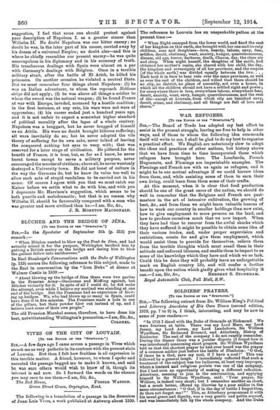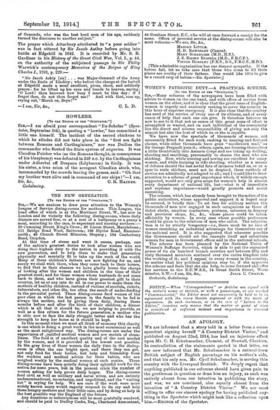SOLDIERS' PRAYERS.
[To THIS EDITOR or THIS " SPECTATOR."'
SIR,—The following extract from Dr. William King's Political and Literary Anecdotes of Kis Own Times (second edition,
1819, pp. 7 to 9) is, I think, interesting, and may be new to some of your readers :— "In 1715 I dined with the Duke of Ormonde at Richmond. We were fourteen at table. There was my Lord Mary, my Lord Jersey, my Lord Arran, my Lord Landsdown, Sir William Wyndham, Sir Redmond Everard, and Atterbury, Bishop of Rochester. The rest of the company I do not exactly remember. During the dinner there was a jocular dispute (I forget how it was introduced) concerning short prayers. Sir William Wyndham told us that the shortest prayer he had over heard was the prayer of a common soldier just before the battle of Blenheim: 0 God, if there be a God, save my soul, if I have a soul!' This was followed by a general laugh. I immediately reflected that such a treatment of the subject was too ludicrous, at least very improper, whore a learned and religious prelate was one of the company, But I had soon an opportunity of making a different reflection. Atterbury, seeming to join in the conversation, and applying himself to Sir William Wyndham, said: ' Your prayer, Sir William, is indeed very short; but I remember another as short, but a much better, offered up likewise by a poor soldier in the same circumstances : " 0 God, if in the day of battle I forget thee, do thou not forget me!" This, as Atterbury pronounced it with his usual grace and dignity, was a very gentle and polite reproof, and was immediately felt by the whole company. And the Duke
of Ormonde, who was the best bred man of his age, suddenly turned the discourse to another subject."
The prayer which Atterbury attributed to "a poor soldier" was in fact uttered. by Sir Jacob Astley before going into battle at Edgehill in 1642. It is recorded by Mr. S. R. Gardiner in his History of the Great Gina War, Vol. I., p. 44, on the authority of the subjoined passage in Sir Philip Warwick's contemporary Idemoires of the .Reign of King Charles I., 1701, p. 229 :— " Sir Jacob Ashly [sic] . . . was Major-Generall of the Army under the Earle of Lindsey ; who before the charge at the batten at Edgehill made a most excellent, pious, short, and soldierly prayer : for he lifted up his eyes and hands to heaven, saying: 0 Lord ! thou knowest how busy I must be this day : if I forget thee, do not thou forget me l' And with that, rose up, crying out, 'March on, Boys !'



































 Previous page
Previous page